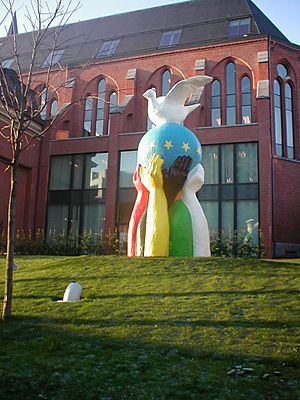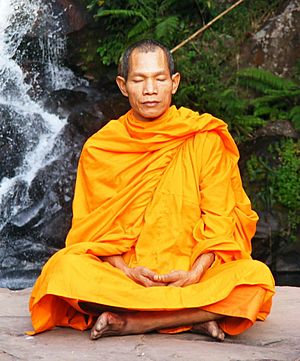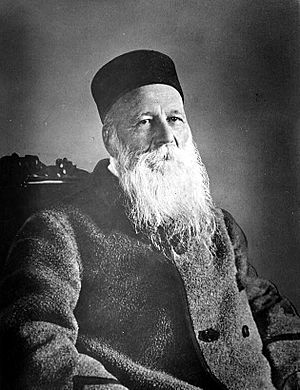Peace facts for kids
Peace is a time when there are no fights or wars. It can also mean a calm and quiet state, like a still pond without ripples. It's about being in harmony and not being disturbed by anything.
Many people and groups want peace. After World War I, an organization called the League of Nations was created to help stop wars. When it didn't prevent World War II, it was replaced by the United Nations. The United Nations still works to make the world peaceful. If one country attacks another without being attacked first, other member countries will try to help the country that was attacked. This idea was used to help South Korea and Kuwait when they were attacked.
Martin Luther King Jr. once wrote that "True peace is not merely the absence of tension: it is the presence of justice." This means that real peace isn't just when problems are gone; it also needs fairness for everyone.
Alfred Nobel started a special award called the Nobel Peace Prize. It is given every year to a person who has done the most to bring peace to the world.
Contents
Peace and different beliefs
People with different beliefs often think about peace in their own ways.
- Buddhists believe that true peace comes when all suffering ends. To reach this peace, many follow teachings called the Four Noble Truths.
- Jews and Christians believe that real peace comes from having a close relationship with God. Jesus Christ, who is sometimes called the "Prince of Peace," said: "Peace I leave with you; my peace I give you. I do not give to you as the world gives. Do not let your hearts be troubled and do not be afraid." (John 14:27)
Inner peace
Inner peace, or peace of mind, means feeling calm and strong inside yourself. It's about having enough understanding to stay peaceful even when things are stressful. Many people think that being "at peace" inside is healthy and makes you happy, unlike feeling stressed or worried.
To find inner peace, some cultures use practices like prayer, meditation, Tai chi, or yoga. These practices can help people feel calm and understand themselves better.
Working for peace
Peace movements
A peace movement is a group of people who work to end wars or reduce violence. They often want to achieve world peace. These groups might use different ways to reach their goals, such as:
- Supporting pacifism, which means believing that war and violence are always wrong.
- Using non-violent resistance, which means protesting or resisting without fighting.
- Encouraging diplomacy, where countries talk to each other to solve problems.
- Organizing boycotts or demonstrations.
- Asking politicians to create laws that protect human rights and follow international law.
Nobel Peace Prize
The Nobel Peace Prize is a very important award given to people who have done great things for peace. It has been given out every year since 1901 by the Norwegian Nobel Committee.
The prize was created by Alfred Nobel. He said it should go to the person who has done "the most or the best work for friendship between nations, for getting rid of or reducing armies, and for holding and promoting peace meetings."
What is peace?
In peace studies, which is the study of how conflicts can be solved, there are many ideas about what "peace" means. It can be different depending on your religion, culture, or what you are studying.
Generally, peace is seen as a state of balance and understanding. It's when people respect each other's differences and are tolerant. Conflicts are solved by talking, people's rights are respected, and everyone feels calm without social tension.
Monuments for peace
Many places around the world have monuments built to celebrate peace. Here are a few examples:
| Name | Location | Meaning | Image |
|---|---|---|---|
| Japanese Peace Bell | New York City, NY | Symbolizes world peace. |  |
| Fountain of Time | Chicago, IL | Celebrates 100 years of peace between the US and UK. |  |
| Fredensborg Palace | Fredensborg, Denmark | Marks the peace treaty between Denmark–Norway and Sweden after the Great Northern War. |  |
| International Peace Garden | North Dakota, Manitoba | Represents peace between the US and Canada, and world peace. | 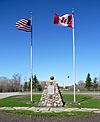 |
| Peace Arch | Border between US and Canada, near Surrey, British Columbia. | Honors 100 years of peace between Great Britain and the United States after the Treaty of Ghent in 1814. | 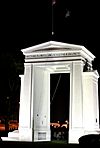 |
| Statue of Europe | Brussels | Shows unity and peace in Europe. | 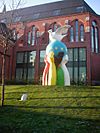 |
| Waterton-Glacier International Peace Park | Alberta, Montana | Symbolizes world peace. | 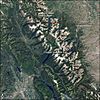 |
| Japanese Garden of Peace | Fredericksburg, Texas | A gift from Japan to the US, honoring Chester W. Nimitz and offering a peaceful place. |  |
Images for kids
-
A peace dove statue in Lomé, Togo. The dove and olive branch are common symbols of peace.
-
Before the word 'peace' came into English, Anglo-Saxons used "friðu sibb" for a 'pledge of peace'.
-
Mahatma Gandhi, a famous leader who promoted non-violence.
-
Martin Luther King Jr. at a civil rights march in Washington, D.C.
See also
 In Spanish: Paz para niños
In Spanish: Paz para niños


